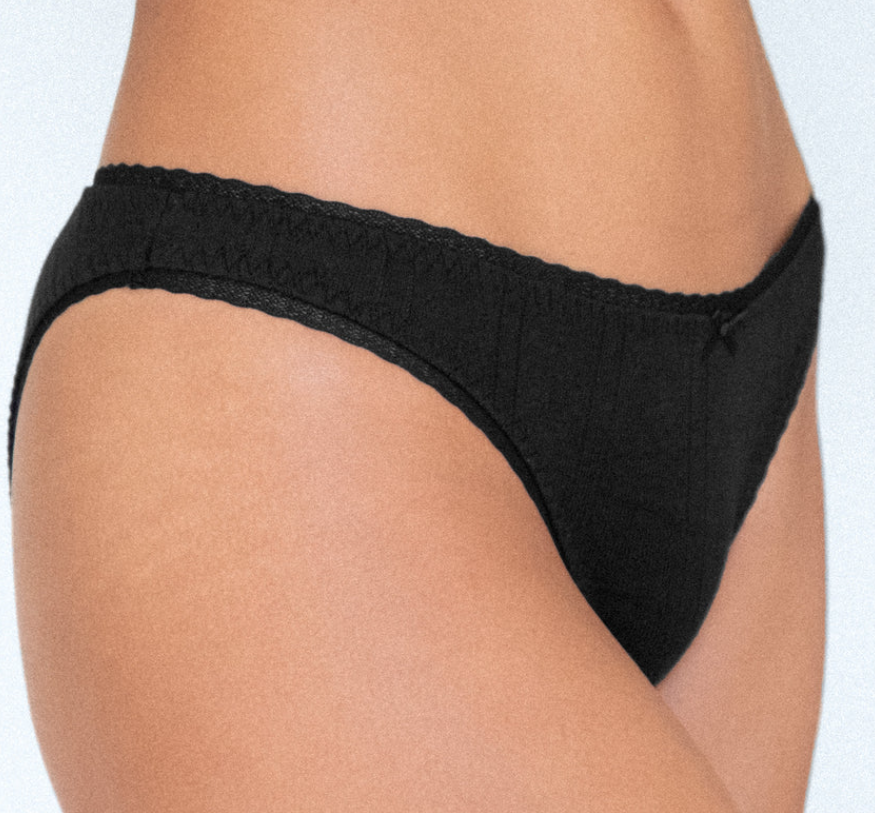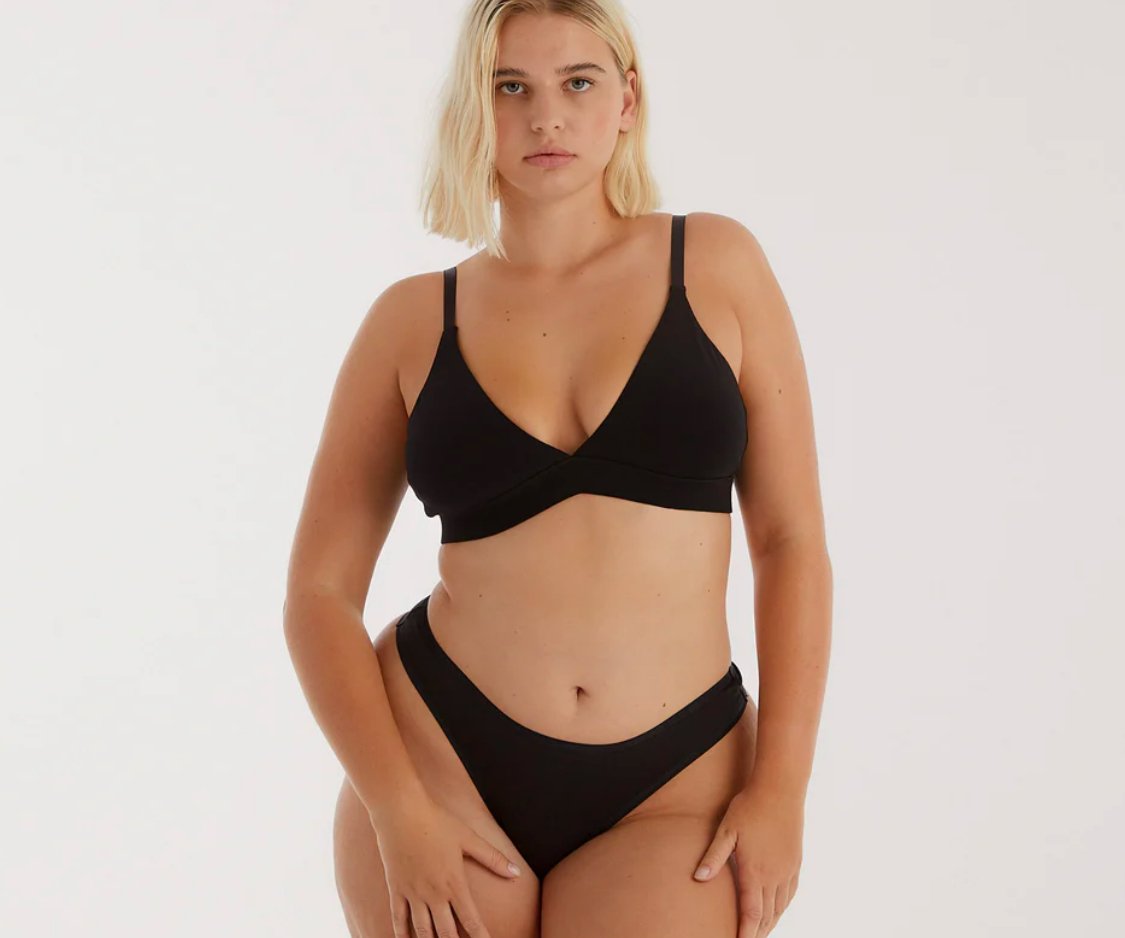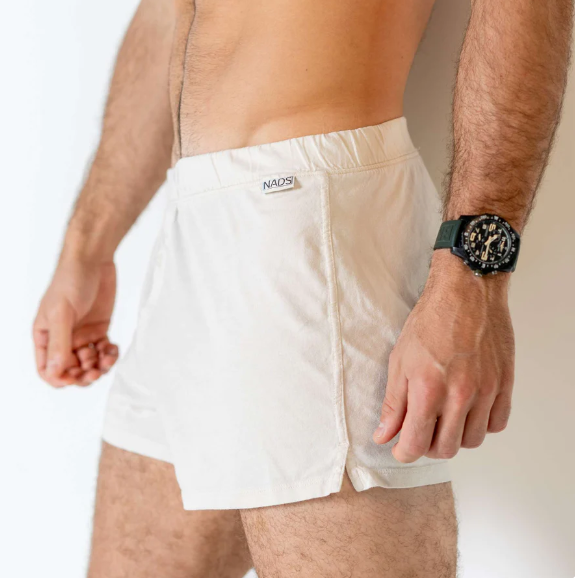Non-Toxic Natural Fabric Underwear Brands
Why should you opt for Organic underwear?
Q: Can your underwear impact your health?
A: In short, yes. Read on to find out how.
Your skin is your largest organ and can absorb that which it comes into contact with. Studies have shown that chemicals can run off of fabrics upon contact with the skin. A 2018 study even found that prolonged exposure to a chemical commonly used in clothing dyes called benzothiazole (BT) resulted in the uptake of BT into the body, raising a growing concern for the ability of chemicals to run off of fabrics into the body upon contact with the skin. This is especially true when you sweat, as sweat can pull chemicals off fabrics and into the body.
This is where underwear comes in, as it sits closest to the skin and to your most sensitive and highly absorbent assets. Unfortunately, most underwear is made out of petrochemical-based, synthetic (read: plastic) fabrics and treated with toxins, without a disclaimer of “wear at your own risk” attached. This is why it is best to opt for all-natural, certified Organic fibers that are not processed with toxic chemicals.
(p.s., unsure what makes a piece “certified” Organic? Check out all things Organic cotton here.)
Let’s dive deeper into the top 5 reasons why underwear made from Organic fibers are healthier for you - and the environment.
Free from Pesticides
Organic fibers are free from the harmful chemicals used in conventional farming and synthetic fiber production that can be absorbed by the skin upon wear. Specifically, Organic farming is done without pesticides, which have been linked to endocrine disruption. One study focused on their impact on women’s hormonal health and linked pesticide exposure to both reproductive and thyroid hormone disturbances.
Removing the use of synthetic pesticides, herbicides, and insecticides as is done in Organic fiber production also provides a safer working environment for farmers. This is also a healthier option for farmers as the active ingredients of synthetic pesticides meant to control harmful organisms can also be hazardous to the farmers directly caring for the crops, especially when they do not receive adequate protective measures and training, as is many times the case in developing countries.
Produced Without BPA and PFAS
As Organic fibers are plant-based, they remove the health implications associated with synthetic textiles such as the presence of other endocrine disruptors like BPA, which is a key ingredient used to manufacture plastic, so it may be found in petrochemical-based synthetics such as polyester. This is super important as BPA has been linked to a variety of health risks, from impacting fetal development to causing negative fertility effects in both men and women, and delaying the onset of puberty in women.
Another endocrine disruptor, PFAS (also known as ‘forever chemicals’) are also many times found in synthetics, primarily those marketed as waterproof/water-resistant and stain-resistant. The body is virtually unable to metabolize PFAS, meaning they remain in the body for years (hence the “forever” part). PFAS exposure has been linked to negative reproductive effects such as decreased fertility, reducing immune responses (including reduced response to vaccines) and increasing the risk of prostate, kidney, and testicular cancers. The disruption of lipid regulation leading to an increase in cholesterol levels, as well as impaired thyroid hormone levels upon PFAS exposure have also been found. Organic certifications such as the Global Organic Textile Standard (GOTS) certification ban the use of PFAS, so look for pieces that are GOTS certified.
p.s., the GOTS certification is one of the top standards for Organic fiber production. GOTS-certified facilities have to adhere to certain environmental standards - such as ensuring that in the farming process, no pesticides or insecticides were used and all chemistry used by the brand in the production of clothing is in alignment with being truly Organic - as well as social criteria based on leading social sustainability standards.
However, there are other Organic certifications in addition to GOTS, as well as brands that source from farms that use Organic processes but do not have the certification, and brands that use Organic processes but also use toxic treatments in other areas of clothing development. This is why it is best to see the traceability a brand has for transparency of materials and processes, beyond just looking for a certification.
Read more about sustainable fashion certifications here.
Treated with Cleaner Dyes
Organic fiber production - especially those that are GOTS-certified - also includes the monitoring of dye usage, ensuring factories use dyes with lower to no toxicity, thereby removing another harmful chemical from the clothing. As compared to non-organic treatments, which many times use azo dyes. Azo dyes are nitrogen-containing compounds that release amines — known carcinogens — and are water-soluble, meaning they can be absorbed by your skin, especially after sweating or wearing them for a long period of time. The GOTS certification bans the use of azo dyes.
In addition, synthetic fabrics are usually dyed with disperse dyes which can irritate your skin.
Breathable and Hypoallergenic
Organic farming can be especially beneficial for those with chemical sensitivities or skin conditions, as it removes the worry of irritation. Organic fibers such as cotton are naturally hypoallergenic, removing the risk of allergic reactions to the fabric.
Organic cotton is also a naturally breathable and moisture-wicking fabric, making it perfect for underwear as it allows your skin to breathe and stops moisture from being trapped in the more sensitive areas of your body. OBGYNs recommend natural fibers such as cotton as a top choice for underwear as it is breathable and does not hold onto moisture.
Mitigates Climate Change and Pollution
Artificial fertilizers, synthetic pesticides, and toxic dyes can cause environmental pollution in the soil, water, and air. For example, they can drift away in wastewater from the irrigation systems used in conventional farming methods, contaminating waterways that are sources of drinking water and food for nearby communities and impacting nearby land. Removing this contaminant immediately makes organic cotton farming a cleaner option for the environment.
Lastly, when treated well, Organic fibers will last many wears in your wardrobe, as they are not doused with chemicals that can break fabric down over time. This poses a positive benefit both monetarily and by lowering the waste pollution associated with frequent clothing disposal.
Luckily, there are brands that design Organic intimates with all the previously mentioned benefits.
(p.s., this goes for guys too - check out a brand spotlight for men here)
Below is a list of vetted, cleaner choice brands to shop the next time you are looking for intimates.
MATE ~ Use code 15LYDIAD for 15% off your order
This collection is made from lightweight GOTS-certified Organic cotton and a small percentage (5%) of Spandex to give it the stretch it needs for a comfortable, day-long fit. The GOTS certification also confirms the use of clean chemistry - so no synthetic pesticides, insecticides, or herbicides are used, and all dyes used are non-toxic. An added sustainability bonus to this collection is the traceability at a yarn level; meaning, all fibers, yarns, and dyes, as well as the fabric knitting and sewing processes are fully traceable back to the production source.
Subset (they have products for guys too) ~ perfect for everyday wear and workouts, ultra comfortable and flattering (This is my top rec for daily wear!).
Cou Cou ~ fancy, frilly, oh so French.
Ciao Buttercup ~ is a new organic cotton brand with super cute sets that you can wear to forgo wearing a regular bra!
Organic Basics ~ uses all sustainably sourced materials such as organic cotton and recycled materials. Their pieces are ultra functional and flattering!
Nette Rose ~ ethically designs lingerie in small batch production. Their pieces are not organic cotton, but they are sustainably designed with the focus to lower waste.
Indigo Luna ~ uses low-impact, biodegradable materials such as organic cotton, bamboo, and hemp.
Earth and Elle ~ uses organic cotton and bamboo, super comfortable and durable.
Pact ~ (men too!) a tried and true sustainable brand, using all organic cotton, and all Fair Trade Certified.
Maro (for men) ~ 15% off with code LYDIA. 100% organic cotton, 0% plastic. Organic cotton pieces made without plastic, naturally breathable - perfect for any workout! MARO is a performance wear brand combining design, functionality and sustainability to create optimal sportswear.
NADS (for men) ~ Use code LYDIA15 for 15% off. Organic cotton is also a healthier option for guys, as the endocrine disruptors in synthetics can impact their reproductive health in many ways. These boxers are designed by guys, for guys - with tons of reviews as to how great they are, for both daily wear and workouts. I recommend their undyed option!
Don’t forget to tell a friend that it’s time to swap to Organic!



























